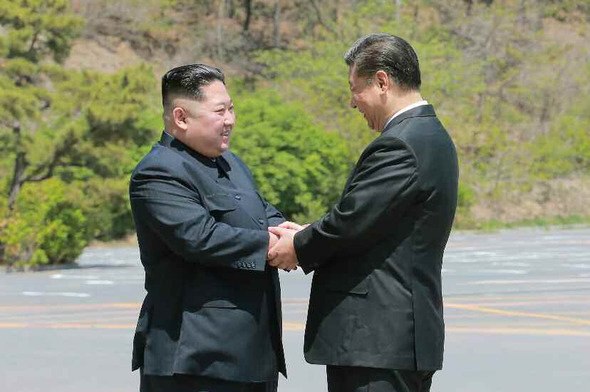 |
|
North Korean leader Kim Jong-un (left) meets with Chinese President Xi Jinping in Dalian, Liaoning Province. China’s Xinhwa News reported that Kim’s visit took place on May 7 and 8. (Yonhap News)
|
North Korean leader takes second trip to China in just 40 days
North Korean leader Kim Jong-un’s surprise visit to the city of Dalian in China’s Liaoning Province and his meeting with Chinese President Xi Jinping on May 7 and 8 raise the question of how this unexpected trip to China will affect the North Korea-US summit. The fact that Kim and Xi held their second meeting in just 40 days shortly before the first ever North Korea-US summit must have had profound motivations, and it is sure to have great significance. Kim’s visit to China broke with tradition, just as his previous visit at the end of March. At the time, Kim had secured a promise from Xi to pay a return visit to Pyongyang, but Kim headed back to China before Xi’s return visit could take place. Though Kim’s father Kim Jong-il had frequently visited China, the shortest interval between his visits was three months. The apparent goal of Kim’s unconventional diplomatic choices is increasing his bargaining power during the North Korea-US summit, which is just around the corner. Chinese Central TV (CCTV) and other Chinese media outlets reported that Kim had wanted to meet with President Xi during his second trip to China to deliver a message and to strengthen strategic communication and cooperation with China. The patent implication is that the purpose of Kim’s visit was to consult with China’s leader about the results of his summit with South Korea and his negotiations with the US. The phrase “strategic cooperation” seems to flaunt the fact that North Korea and China have a shared understanding about the denuclearization of the Korean Peninsula and their strategy toward the US. The fundamental objective of Kim’s surprise visit to China at the end of March was to secure the definite support of China, which has traditionally been North Korea’s backer. The apparent effort by the US government to “raise the bar” shortly before its summit with North Korea may also have been one of the motivations for Kim’s visit to China. While Kim’s first visit was aimed to secure his “backyard,” this unexpected wrinkle may have signaled the need for North Korea and China to strengthen cooperation. Kim reconfirmed that achieving the denuclearization of the Korean Peninsula is North Korea’s “firm, unchanging and clear position.” At the same time, Kim expressed his hopes that North Korea-US summit could lead to “mutual confidence building, that all the related countries would take responsible measures simultaneously and in phases, and that the denuclearization of the Korean Peninsula and permanent peace could be achieved.” This was another reference to the “phased and simultaneous measures” that he mentioned during his first visit to China. Kim was basically letting the US know once again that it must not ask North Korea for unconditional concessions. As the Americans are not announcing the schedule and location of the North Korea-US summit as they promised to do soon, an increasing number of people think that something strange is afoot. Kim’s actions a possible counter-measure against mounting US demands The US recently started using the term “PVID” (permanent, verifiable and irreversible denuclearization) instead of “CVID” (complete, verifiable and irreversible denuclearization), which has been the traditional approach to North Korean denuclearization. US National Security Advisor John Bolton has advocated a hardline stance, calling for the permanent destruction of North Korea’s biological and chemical weapons and for a ban on North Korea’s satellite launches. “Kim Jong-un’s actions are basically a North Korean version of balanced diplomacy that is designed to improve their negotiating position vis-à-vis the US and China,” said Koo Kab-woo, a professor at the University of North Korean Studies. “The spokesperson for North Korea’s Foreign Ministry used an interview with the press to send a warning to the US on May 6 that the North would be displeased if the US really intended to expand the agenda [of the North Korea-US summit to include biological and chemical weapons and the human rights issue]. They might have wanted to discuss that with China,” Koo added. China is also glad to get more attention from North Korea. This is linked to an opportunity for China to play a definite role in the declaration of the end of the Korean War and the subsequent discussion of a peace treaty or a peace regime, since China was a belligerent in that war. While praising North Korea’s commitment to denuclearization in his meeting with Kim, Xi promised to play “an active role in pursuing a peaceful resolution to the issue of the Korean Peninsula and to achieving permanent peace.” Kim Dong-yeop, a research professor at the Kyungnam University Institute for Far Eastern Studies, analyzed North Korea and China’s movements in the context of the US and China’s fight for hegemony on the Korean Peninsula. “Whether Kim Jong-un went of his own volition or whether he was summoned by China, this is connected with the future of US-China relations, or in other words the question of whether it will be the US or China that takes the initiative on the North Korean nuclear issue and a peace regime on the Korean Peninsula,” Kim said. By Kim Oi-hyun, Beijing correspondent, and Noh Ji-won, staff reporter Please direct comments or questions to [english@hani.co.kr]






